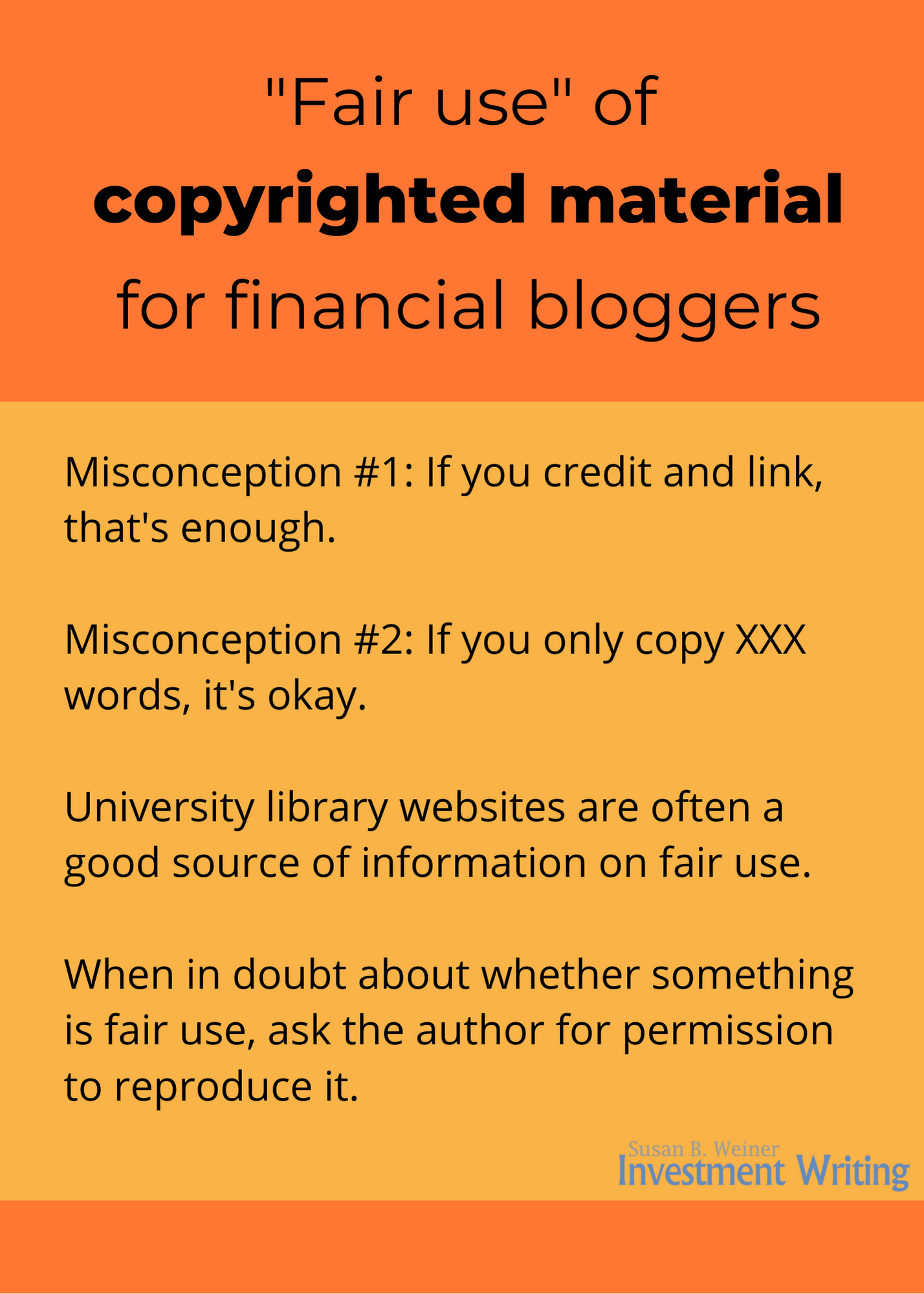Legal danger for financial bloggers: Two misconceptions, three resources, one suggestion
No financial blogger wants to get in trouble with the law, become liable for financial damages, or tarnish his or her reputation. You’ve probably thought about compliance with laws governing advisors registered with the SEC, FINRA, or other regulators. But what about copyright laws?
I believe a significant number of advisor-bloggers are guilty of copyright violations when they share information written by others. I have come across several well-meaning advisors who mistakenly believed they acted within the law when they copied all or part of other people’s blog posts. In fact, they had broken the law and could have been on the hook for financial penalties.
To help you cope, I’ve written this article sharing two common misconceptions, three resources, and one suggestion to keep you on the right side of the law and make everybody happy.
Misconception #1: If you credit and link, that’s enough
Most advisors and other financial bloggers know you shouldn’t copy someone else’s work and pass it off as your own. However, I’ve seen advisors who think it’s okay to copy an entire newspaper article on their blogs as long as they name the author and publication details in addition to linking online to the original article.
This is not correct, as you’ll realize when you check out my resource section below.
Misconception #2: If you only copy XXX words, it’s okay
There is no word-count rule that protects you from charges of copyright infringement. If you use the “heart” of the work, you’re in trouble, as explained under “Factor 3” in the “The four factors of fair use” section of the University of Minnesota University Libraries’ excellent web pages on copyright.
In fact, even short phrases may be protected by copyright, according to “Copyright Protection for Short Phrases” in the Copyright and Fair Use section of the Stanford University Libraries website.
How can you share content without violating copyright? Check out the resources in the next section.
Resources for “fair use” of copyrighted material
Lawyers use the term “fair use” to describe the legal use of copyrighted materials. Here are two websites and a printable checklist that will help you assess whether the amount of another author’s text that you reproduce in your blog post is acceptable. There are no short, easy guidelines that fit all situations.
- “Understanding Fair Use” is a good overview of the issues, presented by the University of Minnesota’s University Libraries.
- “Fair Use,” a book chapter on this topic, is available on the Stanford University Libraries website.
- The “Fair Use Checklist” from Columbia University Libraries will help you think through the issues for specific materials.
Suggestion to ensure “fair use”
When in doubt, ask the author for permission to reproduce the content on your blog. Don’t assume they’ll say “yes.” However, you may score points with writers who are anxious to spread their message. If the writer says, “No,” at least you know to tread carefully in how you use the author’s content.
By the way, I don’t oppose bloggers summarizing or adding their own spin to other people’s content. But please don’t violate copyright by exceeding what is considered “fair use.” Speaking of authors, I’d like to thank the writers on Freelance Success, including Tania Casselle and Erik Sherman, who helped me find resources for this blog post.
NOTE: I updated and deleted some links on July 25, 2013, after finding the original links no longer worked. I updated links again on August 23, 2016; Dec. 31, 2018; and Oct. 1, 2022.
Image courtesy of digitalart/ FreeDigitalPhotos.net






Interesting lawsuit about “fair use”: http://www.thewrap.com/movies/article/midnight-paris-lawsuit-william-faulkner-rights-holder-sues-sony-over-book-reference-62261
Good stuff Susan – I must admit I was not aware that it is a violation to use an article when you cite the source and original link. Does that mean blog aggregators are in violation too or how do they get around that?
Thomas,
Thank you for taking the time to comment!
I’m not familiar with the practices used by those aggregators. Often a very short excerpt is okay when you give the proper credit to the article. I often use short excerpts from articles, as I did in my new blog post that went live today.
If you have questions for your own use, the resources I linked to above should be helpful.
The practices of aggregators were at the center of a pitched battle a few years ago when they were widely blamed for causing the economic downfall of the print publishing industry. I think Rupert Murdoch tried to catalyze an organized counter-movement; but I don’t know how far his efforts extended to initiating legal actions against them (as opposed to merely denouncing them in speeches and editorials).
John A. Byrne – a name that may be familiar to many of Susan’s readers – has written cogently about the economics of aggregators vs. content producers/owners. I am indebted to him for giving me my first grasp of the underlying issues… which overlap with those in Susan’s blog post.
For instance: If you provide ONLY links and credit and an explanatory phrase, as Susan does in this blog post, then you drive traffic to your sources’ own websites. In 21st century publishing, Traffic = Clicks = REVENUE. In contrast, if you provide those things AND ALSO reproduce in your post, all of (or the “heart” of) the external article you are crediting and linking to, then you STEAL TRAFFIC FROM your source’s site. “Steal” may sound extreme here, but that would be what you’d be doing: link or no link, if they can read the whole article on your site, very few readers would ever click through to your source’s site. So, the clicks (=revenue) the source would have realized from their original work, would instead go to you, the copier.
Felix Salmon — my former direct co-worker, incidentally — has also produced much enlightening work on this topic. My preceding paragraph was inspired by one of Felix’s critical posts a few years back about Henry Blodget. (Blodget’s sites regularly copy entire articles from other publications, with credit and links; as Felix convincingly argues, Blodget is stealing work, and money, from the original publishers nonetheless.)
Jon,
Thank you for your thoughtful addition to this conversation. Those are good points about traffic and revenue.
Hi Susan great article. I would add that if someone does scrape your content (versus a legitimate blogger who properly credits you) through an aggregator or in full you should ask them to remove your content and any links back to your site. Google is penalizing sites that have spammy inbound links!
Good point, Stephanie! Here’s a link to help people do that if their content is scraped onto a Google site: http://support.google.com/bin/static.py?hl=en&ts=1114905&page=ts.cs.
Wow, Susan. Great topic and great resources.
Cathie,
I’m glad you found this helpful!